
1. Introduction
In the world of weight loss, diet plays a crucial role in achieving sustainable results. Fruits in daily meals are often encouraged, as they provide essential nutrients while supporting a calorie-conscious eating plan. Fruits are rich in fiber, vitamins, and antioxidants that contribute to overall health and well-being, but they also help in weight management. Their natural sweetness satisfies sugar cravings without the unhealthy calories found in processed foods, making fruits an excellent choice for those looking to lose weight.
The question remains, though: which fruits are the best for weight loss? Not all fruits have the same impact on your body, and understanding which ones are most beneficial can accelerate your journey to a healthier you. Some fruits are high in fiber, helping to keep you feeling full for longer, while others are loaded with water content, keeping you hydrated and curbing unnecessary snacking. This article will delve into the top fruits that can aid weight loss, shedding light on their unique nutritional properties and how they work in the body to promote fat-burning and better metabolism.
2. Benefits of Fruits for Weight Loss
Fruits play a powerful role in any weight-loss journey due to their low-calorie content and high nutritional value. One of the most significant benefits is their high fiber content, which promotes satiety and reduces overall calorie intake. Fiber slows down digestion, allowing your body to absorb nutrients more effectively and helping you feel full for longer periods.
In addition to fiber, fruits are loaded with essential vitamins and antioxidants that boost overall health while aiding in weight loss. Antioxidants, particularly those found in berries, help to combat inflammation, which is often linked to obesity and metabolic disorders. Vitamins such as C and E, found in citrus fruits and tropical fruits like kiwi and papaya, support the immune system, making it easier for your body to function efficiently during weight loss efforts.
Another crucial factor that makes fruits ideal for weight loss is their natural sweetness. Unlike processed sugars, the natural sugars found in fruits do not cause a spike in insulin levels, preventing blood sugar crashes that often lead to overeating. For those looking to control cravings for sweets, fruits like grapes, mangoes, and oranges offer a guilt-free solution that satisfies the taste buds without derailing progress. The combination of fiber, vitamins, antioxidants, and water content makes fruits a powerful tool for maintaining a calorie deficit while promoting health and wellness.
3. Criteria for Selecting Weight-Loss-Friendly Fruits
When choosing fruits for weight loss, it is important to focus on those that offer a combination of high fiber, low calories, and a low glycemic index (GI). The glycemic index measures how quickly a food raises blood sugar levels, and selecting fruits with a low GI can help keep your blood sugar levels stable.
Fiber-rich fruits are also essential for weight loss as they promote fullness and prevent overeating. This fiber not only supports digestion but also slows down the absorption of sugars, ensuring that you don’t experience sugar highs. For individuals looking to lose weight, choosing fiber-dense fruits can make it easier to stick to a calorie-controlled diet.
Hydrating fruits should also be prioritized when selecting the best options for weight loss. Consuming hydrating fruits helps keep the stomach full while adding minimal calories to your diet, which can prevent unnecessary snacking and overeating.
4. Top Fruits for Weight Loss
i. Apples
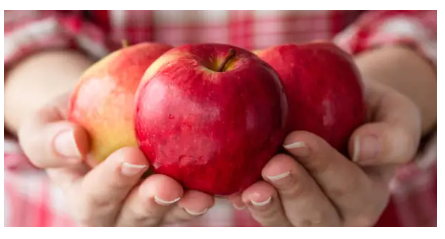
Apples are one of the most effective fruits for weight loss, known for their low-calorie content and high fiber levels. A medium-sized apple contains roughly 95 calories and around 4 grams of dietary fiber, making it a perfect snack to stave off hunger without consuming excessive calories. The fiber in apples, particularly pectin, helps slow digestion and promotes a feeling of fullness, preventing overeating and snacking on unhealthy foods. Additionally, apples have a low glycemic index (GI), meaning they don’t cause a rapid spike in blood sugar levels, further supporting weight management by keeping cravings in check.
Beyond weight loss, apples offer a variety of other health benefits. They are rich in antioxidants, such as flavonoids and vitamin C, which help reduce inflammation and support immune function. These benefits make apples a must-have in any weight-loss plan, as they provide essential nutrients without compromising on calories. Apples are versatile too, making them easy to incorporate into your daily diet—whether as a quick snack, in salads, or blended into smoothies. Their natural sweetness also makes them a healthy substitute for sugary snacks, helping you manage your sugar intake more effectively.
ii. Berries (Blueberries, Strawberries, Raspberries)

Berries are nutrient-dense, low-calorie fruits packed with antioxidants and fiber, making them an excellent choice for anyone looking to lose weight. Blueberries, strawberries, raspberries, and blackberries are all rich in essential nutrients while being low in calories. For instance, one cup of raspberries contains only about 64 calories and a significant 8 grams of fiber. This high fiber content helps control hunger by keeping you feeling full for longer, preventing overeating, and reducing overall calorie intake. Berries are also loaded with antioxidants like anthocyanins, which have been shown to reduce inflammation and improve fat metabolism.
Berries are also naturally low in sugar, making them an ideal alternative to sugary snacks. Their low glycemic index ensures they don’t cause spikes in blood sugar levels, which can lead to cravings and overeating. Incorporating berries into your diet is easy—they can be added to oatmeal, mixed into yogurt, blended into smoothies, or eaten on their own as a snack. Their versatility and nutritional value make berries a weight-loss powerhouse, providing both flavor and function in your diet.
iii. Grapefruit
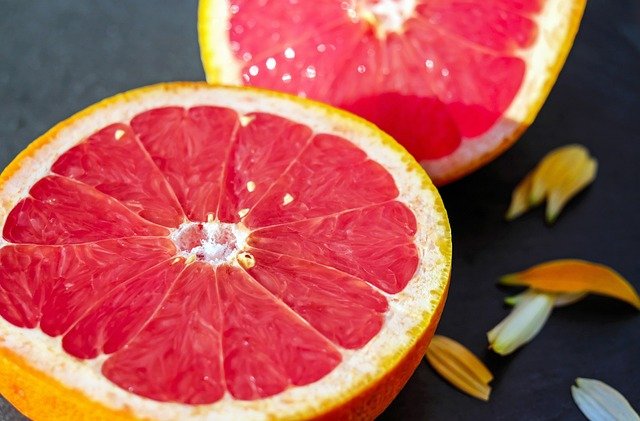
Grapefruit has long been associated with weight loss due to its fat-burning properties. This low-calorie fruit is packed with essential nutrients and compounds that aid in fat metabolism. Half a grapefruit contains just 39 calories, yet it provides a good amount of fiber, which promotes satiety. The fiber in grapefruit helps slow digestion, keeping you full and reducing the likelihood of snacking between meals. Research has also shown that grapefruit may improve insulin sensitivity, helping regulate blood sugar levels and reduce fat storage, making it an ideal fruit for those looking to burn fat more efficiently.
In addition to its fiber content, grapefruit is rich in vitamin C, which boosts immune function and supports overall health. Grapefruit’s unique compound, naringenin, has been shown to improve fat metabolism and support weight loss by reducing insulin resistance. This citrus fruit is a perfect addition to your breakfast or as a snack during the day. However, if you’re on medication, it’s important to check with your doctor before consuming grapefruit, as it can interact with certain prescriptions. Nevertheless, for those looking to lose weight, grapefruit is a refreshing and nutritious option that can help you achieve your weight-loss goals effectively.
iv. Watermelon

Watermelon is one of the most hydrating fruits available, as it is composed of over 90% water. This makes it a perfect low-calorie fruit for those looking to lose weight, with just about 30 calories per 100 grams. Staying hydrated is key to managing cravings and reducing overeating, as dehydration can often be mistaken for hunger. Eating watermelon helps maintain fluid balance, keeping you feeling full and reducing the temptation to snack on less healthy options. Moreover, watermelon’s natural sweetness satisfies sugar cravings without the calorie burden of sugary snacks.
Watermelon is also a good source of vitamins A and C, which promote healthy skin and boost immune function. Additionally, it contains lycopene, a powerful antioxidant that helps combat oxidative stress, which can hinder fat loss. The amino acid citrulline found in watermelon may also support fat metabolism by promoting better blood flow and reducing muscle soreness post-exercise, making it a great post-workout snack. Incorporating watermelon into your diet is easy—it can be enjoyed on its own, added to smoothies, or paired with other fruits in a refreshing salad.
v. Pears
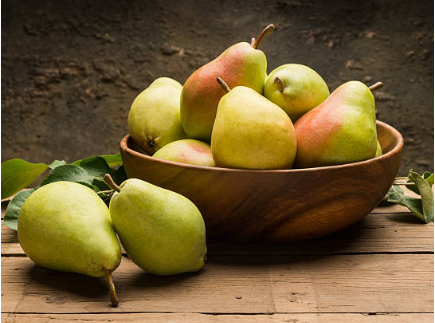
Pears are a fantastic choice for weight loss due to their high fiber content. A medium pear contains around 6 grams of dietary fiber, which is roughly 24% of the recommended daily intake. This fiber helps slow digestion, keeping you fuller for longer and reducing overall calorie consumption. Pears also contain pectin, a soluble fiber that not only aids digestion but also helps regulate blood sugar levels, preventing spikes and crashes that can lead to cravings. By promoting stable energy levels, pears make it easier to avoid unhealthy snacking throughout the day.
In addition to fiber, pears are a good source of essential vitamins such as vitamin C and potassium, which contribute to overall health and wellbeing. Pears also have a low glycemic index, meaning they do not cause a rapid increase in blood sugar levels. This makes them a great snack for weight management, as they can help control appetite without leading to spikes in insulin. Pears can be eaten raw, added to salads, or even baked as a healthy dessert option. Their versatility and fiber-rich profile make them a valuable addition to any weight loss plan.
vi. Avocados

Though often thought of as a high-calorie fruit, avocados are packed with healthy fats that support weight loss by boosting metabolism and promoting fat-burning. A medium avocado contains roughly 234 calories, but its monounsaturated fats help regulate cholesterol levels and enhance fat loss. These fats help keep you satisfied, reducing the urge to snack on unhealthy foods throughout the day. The healthy fats in avocados also help absorb fat-soluble vitamins (like vitamins A, D, E, and K), making them a nutrient-dense addition to any meal plan.
Avocados are rich in fiber as well, with about 10 grams in just one fruit. This fiber promotes digestive health and keeps you full for longer periods, curbing unnecessary calorie consumption. They are also loaded with potassium, a nutrient that helps reduce bloating and water retention, which can be beneficial for anyone aiming to lose weight. Adding avocados to your diet can be as simple as using them in salads, spreads, or smoothies, making them a versatile and delicious way to enhance your weight loss efforts.
vii. Kiwis
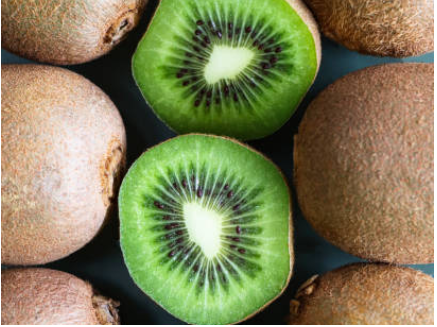
Kiwis are another excellent choice for weight loss due to their high fiber content and ability to promote healthy digestion. A single kiwi contains about 2 grams of fiber, with both soluble and insoluble varieties. This combination helps regulate bowel movements, reduce bloating, and keep your digestive system functioning smoothly. The enzyme actinidin, found in kiwis, aids in breaking down proteins, further enhancing digestion and nutrient absorption. This makes kiwis particularly beneficial for those looking to improve digestion while losing weight.
In addition to fiber, kiwis are packed with vitamin C, providing over 100% of the daily recommended intake in just one fruit. Vitamin C plays a vital role in fat oxidation, meaning it helps the body convert stored fat into energy. By incorporating kiwis into your diet, you not only improve digestion but also enhance fat-burning processes. Kiwis are easy to incorporate into meals—whether eaten on their own, blended into smoothies, or added to fruit salads, they are a delicious and effective way to support weight loss.
viii. Papaya
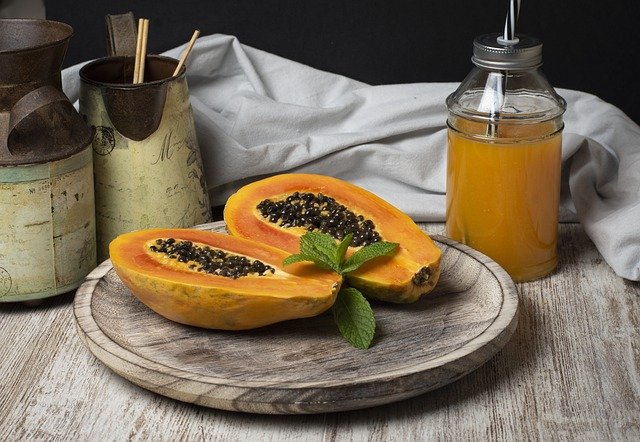
Papaya is a low-calorie fruit that aids in digestion and helps reduce bloating, making it ideal for weight loss. One cup of papaya contains only around 60 calories but offers significant amounts of fiber and digestive enzymes like papain. These enzymes assist in breaking down proteins and improve digestive health, which is critical when trying to lose weight. Poor digestion can lead to bloating and discomfort, but papaya’s natural enzymes help keep the digestive system running smoothly, preventing these issues and promoting a flatter stomach.
Papaya is also rich in antioxidants, including beta-carotene and vitamins A and C, which help reduce inflammation and improve overall health. Its high water content also contributes to hydration, which is crucial for metabolic function and fat burning. This tropical fruit is easy to incorporate into your diet—whether eaten fresh, blended into smoothies, or added to fruit bowls, papaya can help you stay full while providing a burst of nutrients and aiding weight loss.
ix. Oranges

Oranges are well known for their high vitamin C content, which supports the immune system and helps curb cravings by promoting feelings of fullness. A medium orange contains just 60 calories and is loaded with fiber, particularly in the membranes that separate the segments. This fiber helps slow digestion, keeping you satisfied for longer and reducing the desire for unhealthy snacks. The low glycemic index of oranges also ensures that they do not cause blood sugar spikes, making them a great fruit for weight management.
Oranges are also hydrating, with over 85% water content, which supports metabolic processes and helps prevent overeating. The natural sweetness of oranges can also help satisfy sugar cravings, making them a healthy alternative to high-calorie desserts. Whether eaten on their own or added to salads and smoothies, oranges are a versatile fruit that offers both weight-loss benefits and a boost in essential nutrients like vitamin C, potassium, and antioxidants.
5. How to Incorporate These Fruits into Your Diet
Incorporating weight-loss-friendly fruits into your diet is both simple and versatile. One of the best ways to enjoy fruits is by preparing a fresh fruit salad. By combining different fruits like apples, berries, watermelon, and pears, you not only add variety to your meals but also increase your intake of essential vitamins, antioxidants, and fiber. Fruit salads make for a refreshing snack or dessert, offering a healthy alternative to high-calorie options while satisfying your sweet cravings.
Smoothies are another convenient way to include these fruits in your diet. By blending fruits like berries, pears, and grapefruit with a liquid base (such as water, almond milk, or yogurt), you can create a nutrient-packed smoothie that is both delicious and filling. Smoothies are great for breakfast or as a post-workout snack, providing hydration and energy without the excess calories.
Adding fruits to your daily meals is also effortless. You can sprinkle fresh berries over your oatmeal or yogurt for a fiber-rich breakfast or enjoy apple or pear slices as a midday snack. If you’re trying to curb late-night cravings, snacking on watermelon or grapefruit can satisfy hunger without contributing many calories.
6. Conclusion
In conclusion, incorporating fruits like apples, berries, grapefruit, watermelon, pears, avocados, kiwis, papayas, and oranges into your diet can significantly support weight loss and overall health. These fruits are rich in fiber, vitamins, and antioxidants, helping to curb cravings, promote fullness, and boost metabolism. Each fruit offers unique benefits, making them an essential part of any weight-loss plan.
To maximize their impact, enjoy these fruits fresh, blend them into smoothies, or add them to salads. When combined with a balanced diet and regular exercise, these nutrient-dense fruits can make your weight-loss journey more enjoyable and sustainable. By focusing on healthy, low-calorie options, you can nourish your body while effectively managing your weight, proving that achieving your goals doesn’t have to involve deprivation but rather embracing delicious, wholesome foods.


